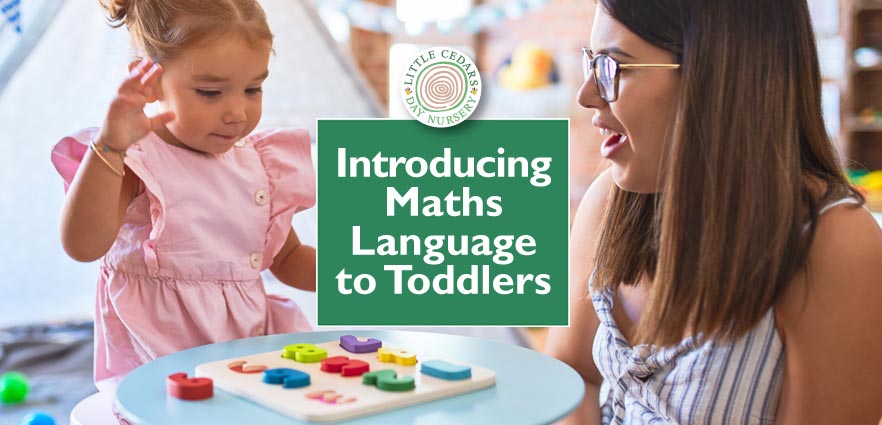
Mathematics is an essential part of everyday life and an understanding of basic maths concepts is crucial for success in virtually all walks of life. 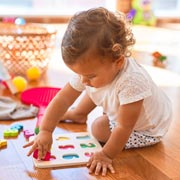 However, many children struggle with maths and have negative attitudes towards the topic. To prevent this, it is important to introduce maths concepts and vocabulary to children at a young age. Fortunately toddlers are at a period of development where they can learn and understand a range of maths words and concepts when given the opportunity. And, by introducing mathematical concepts and vocabulary to toddlers in a fun and engaging way, adults can help children develop a strong foundation in maths and foster a positive attitude towards the subject.
However, many children struggle with maths and have negative attitudes towards the topic. To prevent this, it is important to introduce maths concepts and vocabulary to children at a young age. Fortunately toddlers are at a period of development where they can learn and understand a range of maths words and concepts when given the opportunity. And, by introducing mathematical concepts and vocabulary to toddlers in a fun and engaging way, adults can help children develop a strong foundation in maths and foster a positive attitude towards the subject.
In today’s article, we will explore why it is important to introduce maths language and concepts to toddlers, how parents/caregivers can help those toddlers learn and understand them, and which specific maths-related words can be successfully introduced at this young age. We will also suggest some activities that parents can use to help their toddlers develop a good maths vocabulary.
What Type of Maths Words can Toddlers Learn?
Toddlers can learn and understand a range of maths words and concepts even at their young age. Here are some examples:
Number words
Toddlers can, of course, learn to recognise and say the names of numbers, such as one, two, three, and so on.
Counting concepts
Toddlers can understand the concept of counting i.e. learn to count objects such as toys etc.
Size words
Toddlers can learn to recognise and say size-related words, such as big, small, tall, and short. These all have their root in maths.
Shape words
Toddlers can also learn to recognise and say the names of shapes, which have their root in mathematics. For example, squares, triangles, circles, and rectangles.
Positional words
Toddlers can learn positional words, which again have a kind of root in maths, such as up, down, in, out, on, and off.
Comparatives
Toddlers can learn comparative words such as more, less, equal, the same, and different.
Measurement words
Toddlers can learn measurement-related words such as long, short, heavy, light, full, and empty.
Time words
Toddlers can also learn time-related words such as now, later, early, and late.
The important thing about learning maths words and vocabulary during day-to-day activities is that children don’t even know that they’re learning maths concepts — it comes naturally when nurtured as part of everyday life.
Why Introducing Maths Words to Toddlers is So Important
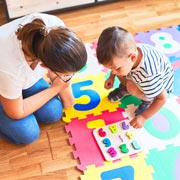 Introducing maths words and language to toddlers is all part of the EYFS curriculum at nurseries like Little Cedars and is important for several reasons:
Introducing maths words and language to toddlers is all part of the EYFS curriculum at nurseries like Little Cedars and is important for several reasons:
It helps develop strong foundations. Introducing maths language to toddlers helps to develop a strong foundation for mathematical concepts that they can build on more fully later on. For example, when toddlers start hearing words such as “one,” “two,” “count,” “more,” and “less,” they begin to develop a basic understanding of numbers, maths concepts and the real world use of counting.
It enhances problem-solving skills. Maths involves problem-solving, and introducing maths-related words and concepts to toddlers helps them develop these problem-solving skills right from an early age. For example, as toddlers learn to count, they also learn to recognise patterns in nature and objects around them. Identifying these patterns is one of the first steps towards developing problem-solving strategies.
It improves language skills. Introducing maths-related language to toddlers can also help improve their language skills, expanding both vocabulary and their ability to communicate effectively. That is incredibly important.
It prepares under-fives for school. Introducing maths words and language to toddlers will also help to prepare them better for when they start school. Once they start, they will already be familiar with the language around mathematics and numeracy and will therefore have a head start in understanding the more advanced maths concepts that school lessons will introduce.
Early maths skills in preschool, such as counting and recognising numbers, are strong predictors of later maths achievement and can help improve maths skills in the long term.
So, as well as helping to lay the foundation for a strong understanding of mathematics itself, introducing maths words and language to children when they’re toddlers helps them develop important additional skills that will benefit them throughout their lives.
How to Help Toddlers Learn Maths Language
 Parents and caregivers can help toddlers learn maths words and maths-related language in a variety of ways. General examples include:
Parents and caregivers can help toddlers learn maths words and maths-related language in a variety of ways. General examples include:
Counting objects; parents can encourage toddlers to count objects such as their own fingers and toes, toys, blocks, things in nature or even food items. This will help toddlers develop counting skills and help them start to understand the concept of numbers and what they mean in day-to-day life.
Reading books; parents can read toddlers books that will introduce maths concepts and vocabulary to them. There are many, many age-appropriate books available that use fun and engaging stories in order to teach basic maths concepts.
Singing songs; singing songs that involve counting and numbers can be a fun and interactive way for toddlers to learn maths-related words and language. Parents can even perhaps try to make up their own songs or rhymes to reinforce any specific maths concepts that they want to highlight to the child.
Playing games; parents can also play games with toddlers that involve counting, sorting, or perhaps even matching or comparing objects (some activity ideas follow below). These types of games reinforce maths vocabulary and can also help children develop problem-solving skills.
Using real-life situations; parents can use real-life situations such as cooking, tidying up or grocery shopping to introduce maths concepts and vocabulary to toddlers. For example, parents can ask toddlers to count the number of apples they need for a recipe, ask them to help sort items in the grocery basket, or count how many socks (or pairs of socks) are hanging on the washing line.
Incorporating maths words and language into everyday play and activities can really help toddlers learn and understand basic maths concepts in a fun and engaging way, without them perhaps even realising that they’re being taught mathematics per se.
Activity Ideas
Here are some more specific activity ideas that can help toddlers develop an understanding of maths concepts and vocabulary in a fun and engaging way:
Shape Hunts
Parents can go on a shape hunt with their toddlers, looking for shapes in the environment such as circles, squares, and triangles. If more than one child is involved, perhaps it could be developed into a competition with prizes. This activity can help toddlers learn the names of shapes and develop visual-spatial skills.
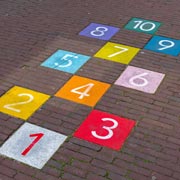 Number Hopscotch
Number Hopscotch
Parents can create a hopscotch game using numbers. Toddlers can practise jumping on the numbers and the adult can encourage them to say the numbers out loud. This will help them develop number recognition and counting skills.
Measurement Activities
Parents can engage toddlers in measurement activities such as pouring water into different size containers or comparing the length of different objects. These activities can help toddlers understand measurement concepts and vocabulary such as volume, height, and length.
Pattern Recognition
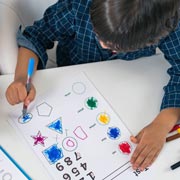 Parents can create simple patterns using objects such as blocks, toys, or coloured pencils, and ask toddlers to continue the pattern. This activity can help toddlers develop their pattern recognition skills and understand basic maths concepts such as repetition and sequencing.
Parents can create simple patterns using objects such as blocks, toys, or coloured pencils, and ask toddlers to continue the pattern. This activity can help toddlers develop their pattern recognition skills and understand basic maths concepts such as repetition and sequencing.
Sorting Activities
Parents can provide toddlers with a variety of objects and ask them to sort them based on different attributes such as colour, size, or shape. This activity can help toddlers understand basic maths concepts such as classification and sorting.
Building Activities
Parents can provide toddlers with building blocks or other construction toys and encourage them to build structures using different shapes and sizes. This activity can help toddlers develop spatial reasoning and understanding of geometry.
 Introducing maths words and concepts to toddlers is an important step in fostering their overall learning and development as well as in relation to success in mathematics itself. By teaching toddlers maths vocabulary and concepts at a young age, we can help them develop strong foundations in maths, enhance their cognitive development and language skills, and improve their attitudes towards maths. It is never too early to start introducing maths concepts to children, and by doing so, we can help them develop a lifelong appreciation of maths as well as nurturing a strong foundation for future success in many areas of their lives.
Introducing maths words and concepts to toddlers is an important step in fostering their overall learning and development as well as in relation to success in mathematics itself. By teaching toddlers maths vocabulary and concepts at a young age, we can help them develop strong foundations in maths, enhance their cognitive development and language skills, and improve their attitudes towards maths. It is never too early to start introducing maths concepts to children, and by doing so, we can help them develop a lifelong appreciation of maths as well as nurturing a strong foundation for future success in many areas of their lives.
Nursery & Pre-School Places in Streatham, London SW16
A Nursery Place for Your Child in Streatham

 Little Cedars Nursery in Streatham invites parents of babies, toddlers and children under five to apply for a childcare place at the setting. We offer high quality childcare on weekdays, virtually throughout the entire year, and give little ones the very best start a child could ever ask for. As well as being somewhere to look after your child, we also nurture their learning and development, giving them a full early years education. We have a good Ofsted rating.
Little Cedars Nursery in Streatham invites parents of babies, toddlers and children under five to apply for a childcare place at the setting. We offer high quality childcare on weekdays, virtually throughout the entire year, and give little ones the very best start a child could ever ask for. As well as being somewhere to look after your child, we also nurture their learning and development, giving them a full early years education. We have a good Ofsted rating.
Come along to see for yourself — we’ll give you and your child a guided tour, answer any questions and you can see for yourself how well your little one will fit in. Please choose an option below to make contact, request a tour or to apply for a nursery/pre-school place and we’ll be delighted to help:
Little Cedars Nursery is located in Streatham, near Streatham Hill, Streatham Park, Streatham Common, Furzedown, Tooting, Tooting Bec, Tooting Broadway, Tooting Common, Balham, Norbury and Colliers Wood.


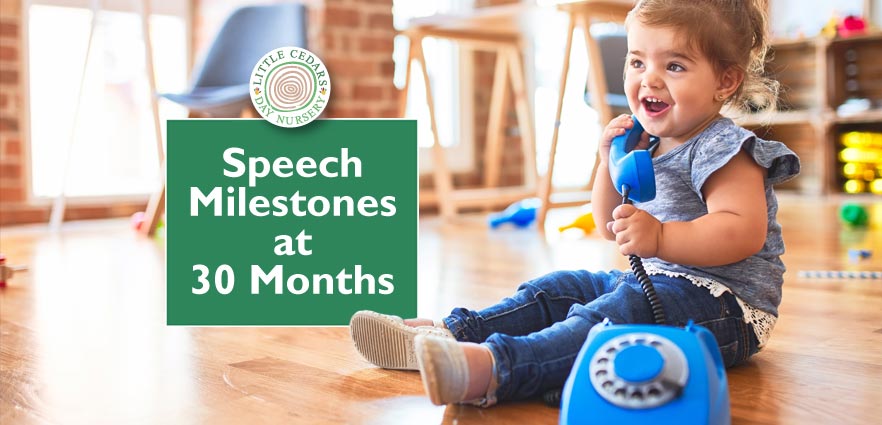
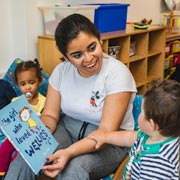 Milestones are a crucial thing to monitor when you’re bringing up a baby or young child. Speech is an important one and it’s one that parents would be wise to take stock of at regular times in their child’s early years. Today we look at this milestone at around the age of 30 months. So, what should you expect your 30-month-old to be able to say at this age and, if appropriate, how can you encourage them to speak more? Let’s explore speech milestones at 30 months…
Milestones are a crucial thing to monitor when you’re bringing up a baby or young child. Speech is an important one and it’s one that parents would be wise to take stock of at regular times in their child’s early years. Today we look at this milestone at around the age of 30 months. So, what should you expect your 30-month-old to be able to say at this age and, if appropriate, how can you encourage them to speak more? Let’s explore speech milestones at 30 months… The more ‘chatty’ time you have with your toddler, the more they will naturally get involved — and learn from you. Talking to your toddler facilitates good listening skills and helps them to build up their own vocabulary, particularly when you make physical reference to the things you are talking about. In this way they can associate a word with its physical equivalent (e.g. holding up or pointing to an object that you’re talking about).
The more ‘chatty’ time you have with your toddler, the more they will naturally get involved — and learn from you. Talking to your toddler facilitates good listening skills and helps them to build up their own vocabulary, particularly when you make physical reference to the things you are talking about. In this way they can associate a word with its physical equivalent (e.g. holding up or pointing to an object that you’re talking about).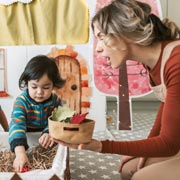 Use repetition. This helps your toddler through hearing the same words over and over again. They will copy and get used to which words go with which scenario in this way. You can take this a step further too…
Use repetition. This helps your toddler through hearing the same words over and over again. They will copy and get used to which words go with which scenario in this way. You can take this a step further too… The same applies to books. Get your toddler to point out details in pictures sand repeat the words after you. You can also ask your toddler questions about the book and get a conversation going, for example, whether they know a particular character, a particular object or a colour. Point to details and see if they know the word, or say the word out loud and let them repeat it.
The same applies to books. Get your toddler to point out details in pictures sand repeat the words after you. You can also ask your toddler questions about the book and get a conversation going, for example, whether they know a particular character, a particular object or a colour. Point to details and see if they know the word, or say the word out loud and let them repeat it.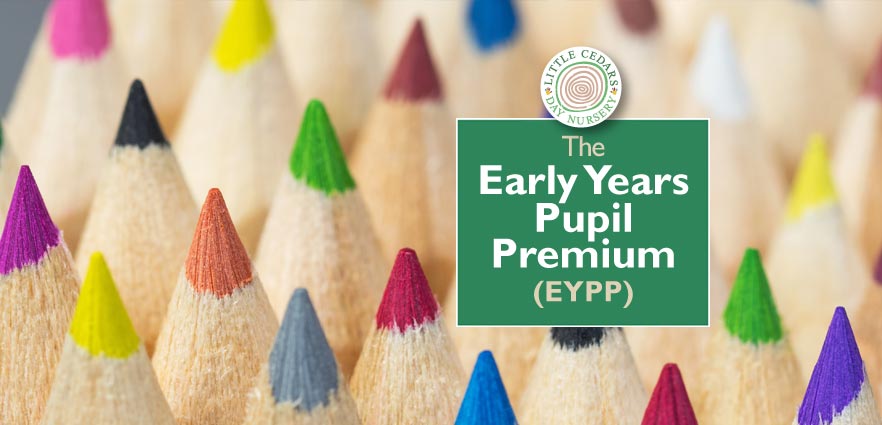
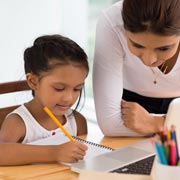 Improving Education for Disadvantaged 3- & 4-Year-Olds
Improving Education for Disadvantaged 3- & 4-Year-Olds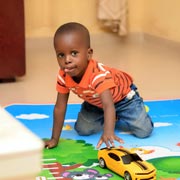 To be eligible for the EYPP funding, a child must meet certain criteria:
To be eligible for the EYPP funding, a child must meet certain criteria: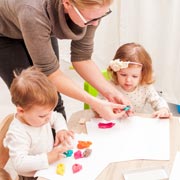 After checking eligibility, interested families or guardians can either
After checking eligibility, interested families or guardians can either 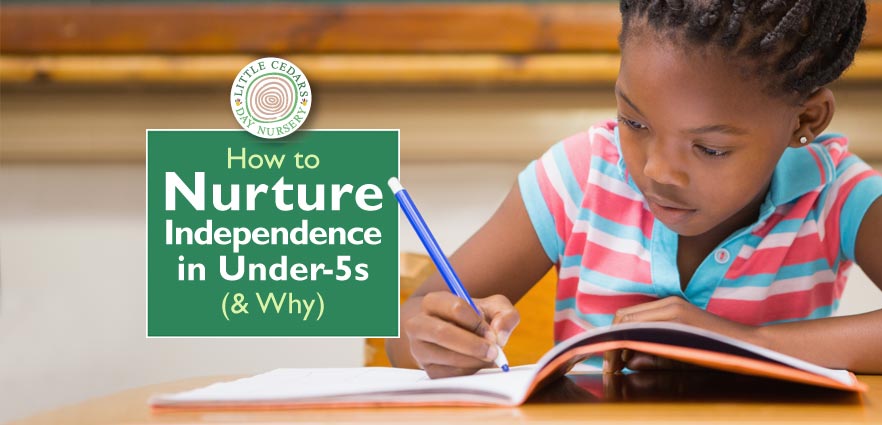
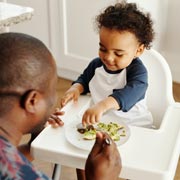 It’s easier and often quicker for adults to take the lead in getting toddlers and under-five children dressed, fed, washed and suchlike. However, at some point, our little ones have to become confident and self-sufficient at doing these – and many other things – themselves. After all, they won’t have Mum or Dad around when they’re starting at school. So, today, we look at the ways we can help children under five help themselves and become more independent, including in their learning. First, though, let’s look at the many benefits of encouraging their independence.
It’s easier and often quicker for adults to take the lead in getting toddlers and under-five children dressed, fed, washed and suchlike. However, at some point, our little ones have to become confident and self-sufficient at doing these – and many other things – themselves. After all, they won’t have Mum or Dad around when they’re starting at school. So, today, we look at the ways we can help children under five help themselves and become more independent, including in their learning. First, though, let’s look at the many benefits of encouraging their independence. Increased self-esteem: Children feel a sense of accomplishment when they are able to do things on their own. This can give a healthy boost to their self-esteem.
Increased self-esteem: Children feel a sense of accomplishment when they are able to do things on their own. This can give a healthy boost to their self-esteem.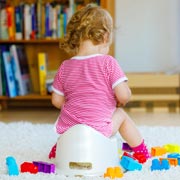 Better self-management skills: Children who are used to taking care of themselves and making their own decisions are better able to manage their own learning and behaviour. This is important, particularly once they move on to a school setting. Studies published in the Journal of Educational Psychology have highlighted better grades and higher levels of achievement in this regard.
Better self-management skills: Children who are used to taking care of themselves and making their own decisions are better able to manage their own learning and behaviour. This is important, particularly once they move on to a school setting. Studies published in the Journal of Educational Psychology have highlighted better grades and higher levels of achievement in this regard. A greater sense of responsibility: Children who are able to do things independently may more easily learn to take responsibility for their own actions and decisions. Learning from one’s own mistakes is also one of life’s most important lessons.
A greater sense of responsibility: Children who are able to do things independently may more easily learn to take responsibility for their own actions and decisions. Learning from one’s own mistakes is also one of life’s most important lessons.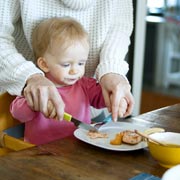 Encourage self-care skills: Help children learn how to dress themselves,
Encourage self-care skills: Help children learn how to dress themselves,  Provide opportunities for children to make their own decisions: Give children small choices and let them choose what they want to do. This helps them feel a sense of control, encourages independence and builds confidence. A good example is allowing them to choose what they want to wear.
Provide opportunities for children to make their own decisions: Give children small choices and let them choose what they want to do. This helps them feel a sense of control, encourages independence and builds confidence. A good example is allowing them to choose what they want to wear.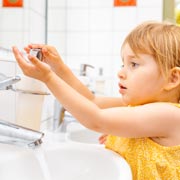 Set realistic expectations: Children are still developing their skills and abilities, so be realistic about what they can do independently.
Set realistic expectations: Children are still developing their skills and abilities, so be realistic about what they can do independently.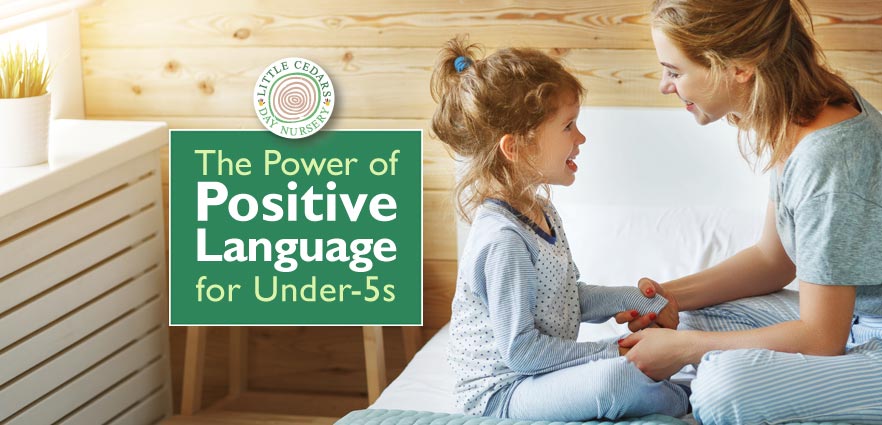
 In today’s post, we explore the benefits of using positive language around under-fives. All too often, it’s tempting to say ‘No!’, ‘Stop that!’ or even ‘Don’t Eat That!’ and similar around little ones. This is particularly true when you want them to cease the offending activity urgently or are simply exhausted if it’s been a challenging day. There are good reasons for such negative commands, of course, not least that of their safety in many cases. However, such commands can sound stern and cause stress for the little ones. What’s more, if a child hears too much negative language and cannot understand why they’re not allowed to do a particular thing, problems can begin to arise and, indeed, the issue can become insidious. It may even result in worsening behaviour. Let’s explore, therefore, the issues around negative language and the simple solution that’s available in the form of positive language.
In today’s post, we explore the benefits of using positive language around under-fives. All too often, it’s tempting to say ‘No!’, ‘Stop that!’ or even ‘Don’t Eat That!’ and similar around little ones. This is particularly true when you want them to cease the offending activity urgently or are simply exhausted if it’s been a challenging day. There are good reasons for such negative commands, of course, not least that of their safety in many cases. However, such commands can sound stern and cause stress for the little ones. What’s more, if a child hears too much negative language and cannot understand why they’re not allowed to do a particular thing, problems can begin to arise and, indeed, the issue can become insidious. It may even result in worsening behaviour. Let’s explore, therefore, the issues around negative language and the simple solution that’s available in the form of positive language.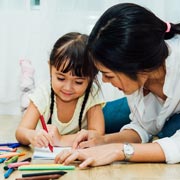 Sometimes, though, constantly hearing ‘no’ can spark tantrums, particularly if a child doesn’t understand the reason they are not allowed to do something. They can feel particularly frustrated when they receive a succession of negative commands and, in the end, may feel they simply can’t do anything right. This can lead not only to stress for them, but also to possible low self-esteem. Furthermore, if they hear ‘no’ and other negative language too often, they can begin to ‘tune out’ to it. They could then go on to develop challenging behaviour due to this, their confusion and frustration. Stress levels can then rise for the parent too, the infant can pick up on this and it can become a real vicious circle. It doesn’t have to be that way, though …
Sometimes, though, constantly hearing ‘no’ can spark tantrums, particularly if a child doesn’t understand the reason they are not allowed to do something. They can feel particularly frustrated when they receive a succession of negative commands and, in the end, may feel they simply can’t do anything right. This can lead not only to stress for them, but also to possible low self-esteem. Furthermore, if they hear ‘no’ and other negative language too often, they can begin to ‘tune out’ to it. They could then go on to develop challenging behaviour due to this, their confusion and frustration. Stress levels can then rise for the parent too, the infant can pick up on this and it can become a real vicious circle. It doesn’t have to be that way, though …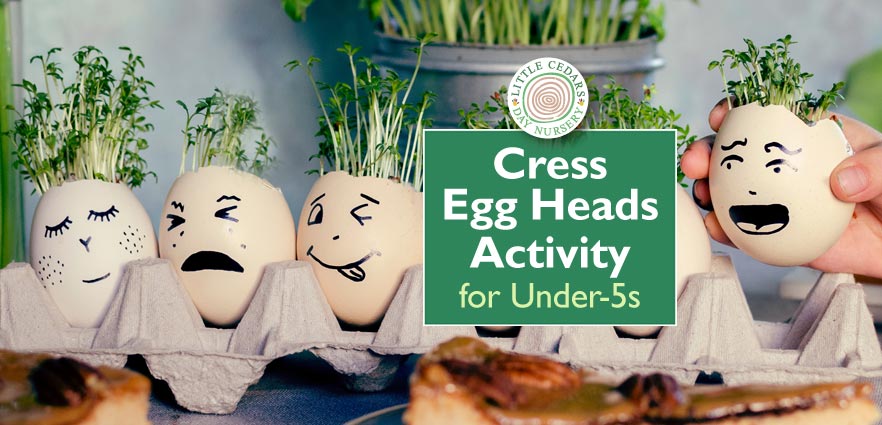
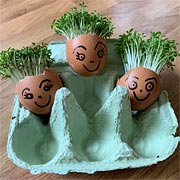 A nature-based, food-related activity that young children can enjoy indoors at any time of the year is cress growing. Today we outline how it can be made even more fun and creative for kids by growing the cress as little ‘egg heads’. These come complete with comical faces and amusing hairstyles made of green cress shoots! Children will absolutely love it when they end up with little egg faces with spouting hairstyles that each have real character. And, they’ll even be able to eat the results!
A nature-based, food-related activity that young children can enjoy indoors at any time of the year is cress growing. Today we outline how it can be made even more fun and creative for kids by growing the cress as little ‘egg heads’. These come complete with comical faces and amusing hairstyles made of green cress shoots! Children will absolutely love it when they end up with little egg faces with spouting hairstyles that each have real character. And, they’ll even be able to eat the results!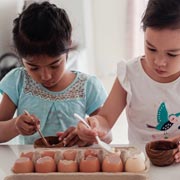 Cress is Easy to Grow, & Tasty!
Cress is Easy to Grow, & Tasty! Growing Cress for Small Kids and Big Kids
Growing Cress for Small Kids and Big Kids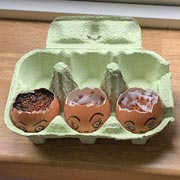 Next, find a vessel to prop the egg shells up in. This could simply be an egg cup or even an egg carton, like that shown in the photo. Then, decide what to fill the empty egg shells with. Children can choose either damp kitchen roll or damp compost/soil to grow the cress seeds on. Carefully fill the empty egg shells almost to the top with the chosen filler. (We tried both and each grew well. Interestingly, the cress seeds grown on kitchen roll tissue paper grew a little faster and therefore taller than those grown on compost. They therefore looked a bit more ‘wild’ — it was quite a surprise and had an amusing impact on the egg-people’s hairstyles).
Next, find a vessel to prop the egg shells up in. This could simply be an egg cup or even an egg carton, like that shown in the photo. Then, decide what to fill the empty egg shells with. Children can choose either damp kitchen roll or damp compost/soil to grow the cress seeds on. Carefully fill the empty egg shells almost to the top with the chosen filler. (We tried both and each grew well. Interestingly, the cress seeds grown on kitchen roll tissue paper grew a little faster and therefore taller than those grown on compost. They therefore looked a bit more ‘wild’ — it was quite a surprise and had an amusing impact on the egg-people’s hairstyles).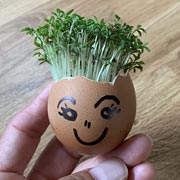 Make sure you or your child add some funny faces on the shells — maybe even give them names. The faces can be drawn simply using a marker pen (Sharpies are ideal) or you can get even more creative using coloured paints. Children may find drawing the faces easier if they are shown some visual reference and perhaps they can practise first on paper. If too young to draw suitable faces, a parent or creative older sibling may be able to help.
Make sure you or your child add some funny faces on the shells — maybe even give them names. The faces can be drawn simply using a marker pen (Sharpies are ideal) or you can get even more creative using coloured paints. Children may find drawing the faces easier if they are shown some visual reference and perhaps they can practise first on paper. If too young to draw suitable faces, a parent or creative older sibling may be able to help.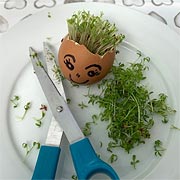 Within a week or so, the little egg heads should begin to sprout green ‘hair’ shoots!
Within a week or so, the little egg heads should begin to sprout green ‘hair’ shoots!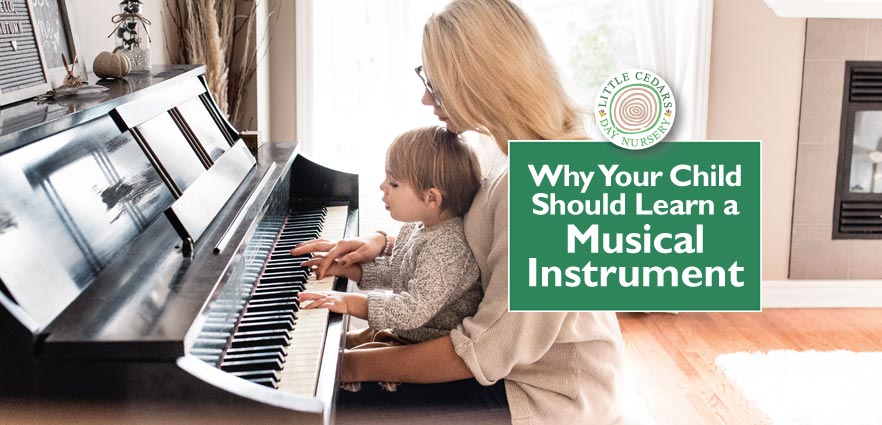
 Both children and adults have a natural affinity with music. It’s one of life’s simple pleasures that just about everyone seems to enjoy in one way or another. Children will naturally start to move, dance, join in or even learn songs that they hear — such reactions seem instinctive to them. Learning to play a musical instrument is therefore a natural next step for them. Indeed, it’s one that parents, guardians and carers should consider encouraging, particularly given how beneficial such an endeavour will be to their child. Learning to play a musical instrument is not simply fun; it profoundly benefits children’s learning and development. With that in mind, we take a look today at the incredible array of benefits that learning a musical instrument poses for children, including under-fives.
Both children and adults have a natural affinity with music. It’s one of life’s simple pleasures that just about everyone seems to enjoy in one way or another. Children will naturally start to move, dance, join in or even learn songs that they hear — such reactions seem instinctive to them. Learning to play a musical instrument is therefore a natural next step for them. Indeed, it’s one that parents, guardians and carers should consider encouraging, particularly given how beneficial such an endeavour will be to their child. Learning to play a musical instrument is not simply fun; it profoundly benefits children’s learning and development. With that in mind, we take a look today at the incredible array of benefits that learning a musical instrument poses for children, including under-fives.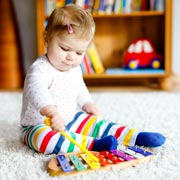 Studies have also shown that learning an instrument or learning how to read music develops the left side of the brain. This area is responsible for processing language and reasoning. Hand-eye coordination skills are also aided when learning to play a musical instrument and reading music. As children’s playing and reading become more advanced, it requires the brain to work at a range of speeds, which is also great exercise for the brain.
Studies have also shown that learning an instrument or learning how to read music develops the left side of the brain. This area is responsible for processing language and reasoning. Hand-eye coordination skills are also aided when learning to play a musical instrument and reading music. As children’s playing and reading become more advanced, it requires the brain to work at a range of speeds, which is also great exercise for the brain. Music gives children a really flexible way of expressing themselves. For instance, the way they choose to bang on a drum, shake a tambourine or strum a guitar can allow them to show happiness, anger, frustration, calmness and many other emotions. Playing a musical instrument gives them a real freedom of expression, even at a very young age. Then, if they reach a point where they are able to make up their own melodies and arrangements, music can become an almost immeasurably powerful tool for self-expression and communication.
Music gives children a really flexible way of expressing themselves. For instance, the way they choose to bang on a drum, shake a tambourine or strum a guitar can allow them to show happiness, anger, frustration, calmness and many other emotions. Playing a musical instrument gives them a real freedom of expression, even at a very young age. Then, if they reach a point where they are able to make up their own melodies and arrangements, music can become an almost immeasurably powerful tool for self-expression and communication.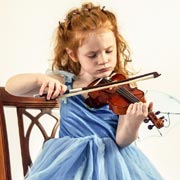 Although playing an instrument is creative, music and maths are very much intertwined. Beats, rhythms and scales are all based on maths and children naturally need to work out some maths in order to understand the song and any sheet music. This will naturally help them to better grasp mathematics and illustrate a real-world example of how it underlies many things.
Although playing an instrument is creative, music and maths are very much intertwined. Beats, rhythms and scales are all based on maths and children naturally need to work out some maths in order to understand the song and any sheet music. This will naturally help them to better grasp mathematics and illustrate a real-world example of how it underlies many things.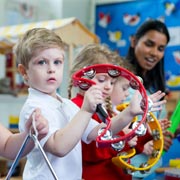 Whether your child is listening to a tutor, teacher, friend or relative, listening skills are very important. Music is a natural way to encourage listening and that’s even more true when children learn to play music themselves. Doing so in their early years will help them to follow instructions, listen out for smaller details as well as the bigger picture. Working together on a piece of music is also a fantastic way to hone group listening skills and teamwork and to encourage collaboration.
Whether your child is listening to a tutor, teacher, friend or relative, listening skills are very important. Music is a natural way to encourage listening and that’s even more true when children learn to play music themselves. Doing so in their early years will help them to follow instructions, listen out for smaller details as well as the bigger picture. Working together on a piece of music is also a fantastic way to hone group listening skills and teamwork and to encourage collaboration.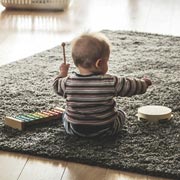 Indeed, music helps to support all 7 focus areas of
Indeed, music helps to support all 7 focus areas of  When children master a song, no matter how basic, they get an enormous sense of achievement and even more so if they are praised by adults and peers. Such praise also encourages the child to progress further, of course. Boosting self-esteem and self-confidence in their early years is important for their future wellbeing too. Achieving something through learning, patience and practising regularly also teaches them that persistence and effort will help them overcome challenges. That’s a very important lesson in life.
When children master a song, no matter how basic, they get an enormous sense of achievement and even more so if they are praised by adults and peers. Such praise also encourages the child to progress further, of course. Boosting self-esteem and self-confidence in their early years is important for their future wellbeing too. Achieving something through learning, patience and practising regularly also teaches them that persistence and effort will help them overcome challenges. That’s a very important lesson in life.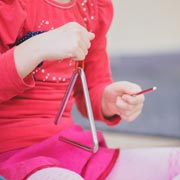 Little ones can first practise keeping in time to music or a beat that an adult is demonstrating, perhaps. Maracas are also good starter instruments although, again, anything that makes a shaking sound can be made at home at zero cost. For instance using an empty carton or plastic container securely sealed with dried rice, pasta or lentils inside. Once they get the hang of such percussive or shaker-style instruments, you can consider transitioning them to more advanced instruments like recorders, ocarinas, keyboards, stringed instruments and so on. Often, children will be more than willing to give such instruments a try and some encouragement and guidance from knowledgeable adults or older children will always be helpful. And, who knows, they could end up being maestros and even stars in the making!
Little ones can first practise keeping in time to music or a beat that an adult is demonstrating, perhaps. Maracas are also good starter instruments although, again, anything that makes a shaking sound can be made at home at zero cost. For instance using an empty carton or plastic container securely sealed with dried rice, pasta or lentils inside. Once they get the hang of such percussive or shaker-style instruments, you can consider transitioning them to more advanced instruments like recorders, ocarinas, keyboards, stringed instruments and so on. Often, children will be more than willing to give such instruments a try and some encouragement and guidance from knowledgeable adults or older children will always be helpful. And, who knows, they could end up being maestros and even stars in the making!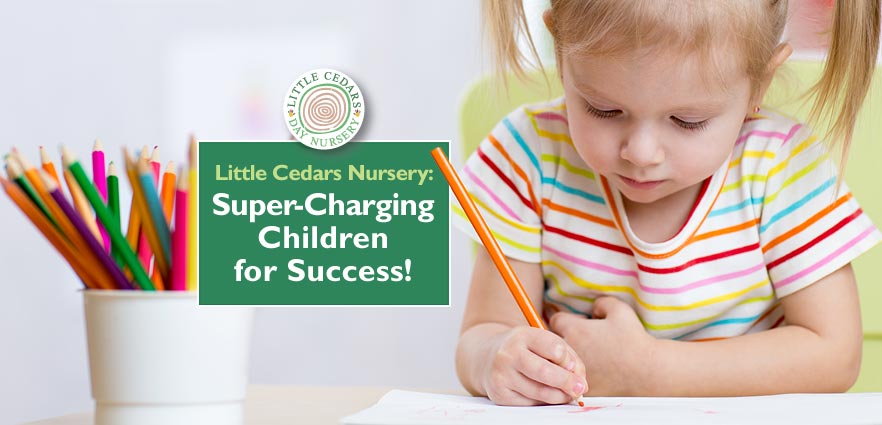
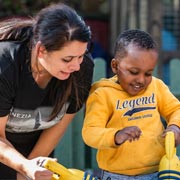 A childcare nursery should not be thought of only as a crèche, playgroup, or simply somewhere that looks after babies and children while parents go to work. Good nurseries and pre-schools like Little Cedars are so much more than that. It’s incredible just how much they benefit under-fives, families and society as a whole once you take a closer look at everything they do — and that’s exactly what we’re doing today…
A childcare nursery should not be thought of only as a crèche, playgroup, or simply somewhere that looks after babies and children while parents go to work. Good nurseries and pre-schools like Little Cedars are so much more than that. It’s incredible just how much they benefit under-fives, families and society as a whole once you take a closer look at everything they do — and that’s exactly what we’re doing today…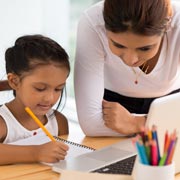 What’s more, staff at childcare settings like Little Cedars will form close bonds with little ones. Studies show that
What’s more, staff at childcare settings like Little Cedars will form close bonds with little ones. Studies show that 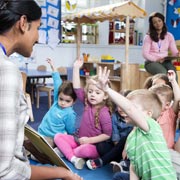 Good Ofsted-registered nurseries/pre-schools like Little Cedars also give under-fives a full early years education. That’s important to know. Through a learning and development programme that’s customised to each individual child, we ensure they achieve their own personal bests in all areas of the statutory
Good Ofsted-registered nurseries/pre-schools like Little Cedars also give under-fives a full early years education. That’s important to know. Through a learning and development programme that’s customised to each individual child, we ensure they achieve their own personal bests in all areas of the statutory  Part of children’s personal, social and emotional development comes through active play with other children that they meet and get to know at the nursery. This is firstly great fun, of course, and that’s a hugely important part of any happy childhood. However, they’ll also learn many things through play. Without socialising with others, it would be more difficult to improve social skills, for example. Only by being around other children will they learn to account for the feelings of others, learn to respect one another and ultimately form close bonds, trust and friendships. Many such friendships will indeed continue long afterwards, as children move to schools at the age of five.
Part of children’s personal, social and emotional development comes through active play with other children that they meet and get to know at the nursery. This is firstly great fun, of course, and that’s a hugely important part of any happy childhood. However, they’ll also learn many things through play. Without socialising with others, it would be more difficult to improve social skills, for example. Only by being around other children will they learn to account for the feelings of others, learn to respect one another and ultimately form close bonds, trust and friendships. Many such friendships will indeed continue long afterwards, as children move to schools at the age of five. Another key aim of good early years childcare provision is to prepare children thoroughly for school. Why? Because
Another key aim of good early years childcare provision is to prepare children thoroughly for school. Why? Because 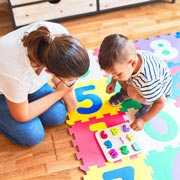 It’s almost as if children are super-charged for success — the benefits of a good early years education are surprisingly long lasting. Some studies even show that the benefits last into people’s working lives, improving salaries (
It’s almost as if children are super-charged for success — the benefits of a good early years education are surprisingly long lasting. Some studies even show that the benefits last into people’s working lives, improving salaries ( Working so closely with babies, toddlers and preschoolers allows us to continually monitor their individual progress. In so doing, we are in a prime position to spot any issues early and to make appropriate arrangements to mitigate them if needed. For example, we may spot that a child is finding reading challenging. If so, we can put extra effort and time into improving the situation for the child. On occasion, that may even include talking to parents about the possible intervention of a specialist of some kind, or it could simply be that they need to practise specific activities to overcome the issue. The earlier challenges or any special educational or developmental needs are spotted, the sooner the child in question can be helped.
Working so closely with babies, toddlers and preschoolers allows us to continually monitor their individual progress. In so doing, we are in a prime position to spot any issues early and to make appropriate arrangements to mitigate them if needed. For example, we may spot that a child is finding reading challenging. If so, we can put extra effort and time into improving the situation for the child. On occasion, that may even include talking to parents about the possible intervention of a specialist of some kind, or it could simply be that they need to practise specific activities to overcome the issue. The earlier challenges or any special educational or developmental needs are spotted, the sooner the child in question can be helped.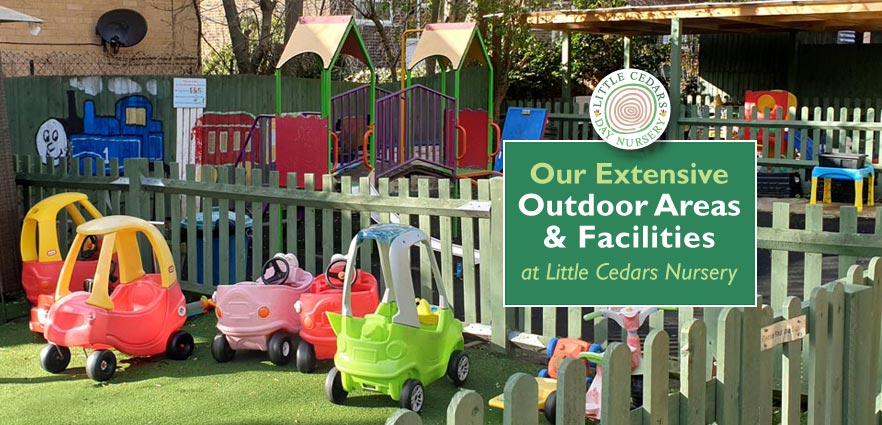
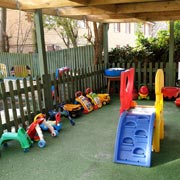 We have a huge outdoor area for children at Little Cedars Nursery, Streatham. Parents express their surprise when they first see it, regularly commenting that it’s much larger than the outdoor areas of other nurseries and pre-schools in the area. Our extensive outdoor play areas are also packed full of fun, educational play equipment and facilities that our under-five children absolutely adore. That includes areas and facilities set up especially for particular age groups.
We have a huge outdoor area for children at Little Cedars Nursery, Streatham. Parents express their surprise when they first see it, regularly commenting that it’s much larger than the outdoor areas of other nurseries and pre-schools in the area. Our extensive outdoor play areas are also packed full of fun, educational play equipment and facilities that our under-five children absolutely adore. That includes areas and facilities set up especially for particular age groups.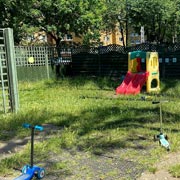 The outdoor ‘mud kitchen’ is a particular hit with children at the nursery. They can enjoy creating in the sand play and water play areas too. These are fun and educational activities —
The outdoor ‘mud kitchen’ is a particular hit with children at the nursery. They can enjoy creating in the sand play and water play areas too. These are fun and educational activities — 
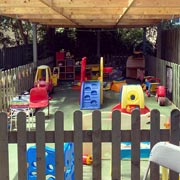 As you can see from some of the photographs, the nursery’s extensive outdoor areas include both open-air and undercover areas. That means children can play and explore whatever the weather. Outdoor play is good for children, teaching them some things that simply can’t be taught indoors, so it’s wonderful that many of the outdoor facilities can be used all-year-round.
As you can see from some of the photographs, the nursery’s extensive outdoor areas include both open-air and undercover areas. That means children can play and explore whatever the weather. Outdoor play is good for children, teaching them some things that simply can’t be taught indoors, so it’s wonderful that many of the outdoor facilities can be used all-year-round.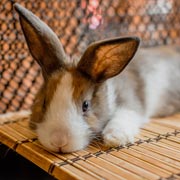 Outdoor play at Little Cedars Nursery also supports the Early Years Foundation Stage (EYFS) curriculum. Learning through outdoor play teaches children so much and in a natural way. Outdoor play supports such areas as communication & language, physical development, personal, social and emotional development and understanding the world. Many such lessons come naturally as children play with one another and interact together via outdoor activities.
Outdoor play at Little Cedars Nursery also supports the Early Years Foundation Stage (EYFS) curriculum. Learning through outdoor play teaches children so much and in a natural way. Outdoor play supports such areas as communication & language, physical development, personal, social and emotional development and understanding the world. Many such lessons come naturally as children play with one another and interact together via outdoor activities.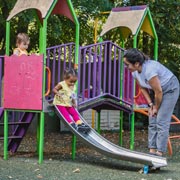 Such staff will continuously identify the individual interests and needs of each child and ensure that the learning and development activities they access will benefit them in the optimum ways. The idea is to further strengthen existing areas where children are strong, while bolstering children’s skills in areas that may require extra focus.
Such staff will continuously identify the individual interests and needs of each child and ensure that the learning and development activities they access will benefit them in the optimum ways. The idea is to further strengthen existing areas where children are strong, while bolstering children’s skills in areas that may require extra focus.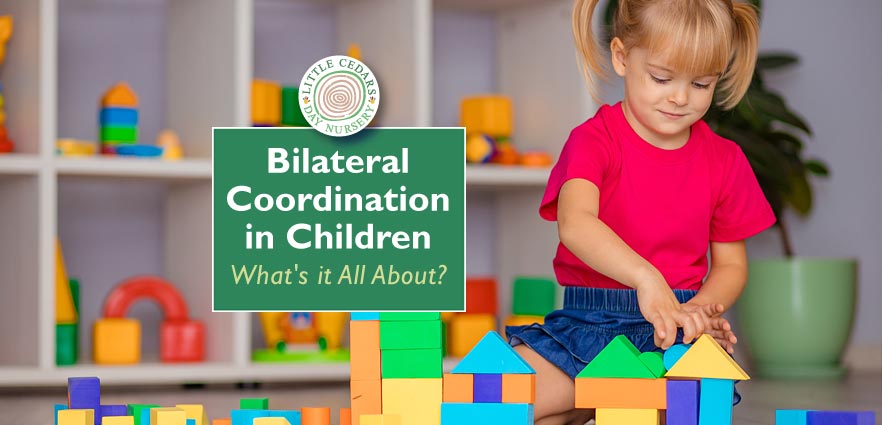
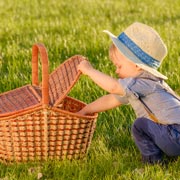 Bilateral coordination is an important skill for children to master and is something that parents should look out for as children develop in their early years. Today we look at the topic, explaining what it is, why it’s important and how mastery of the skill benefits little ones.
Bilateral coordination is an important skill for children to master and is something that parents should look out for as children develop in their early years. Today we look at the topic, explaining what it is, why it’s important and how mastery of the skill benefits little ones.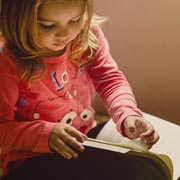 You may also hear reference to the phrase crossing the midline and this is also linked to bilateral coordination. It refers to a person reaching across their body, from one side to the opposite side, in order to complete a task. An example would be a child reaching with their right hand, across their body, to pick up a toy that’s to their left. Crossing the midline in such a way is a significant step because it demonstrates that infants have progressed from naturally using the side of their body nearest the object to using a dominant or preferred side. This may be the first indication parents have of whether their child is going to be left- or right-handed.
You may also hear reference to the phrase crossing the midline and this is also linked to bilateral coordination. It refers to a person reaching across their body, from one side to the opposite side, in order to complete a task. An example would be a child reaching with their right hand, across their body, to pick up a toy that’s to their left. Crossing the midline in such a way is a significant step because it demonstrates that infants have progressed from naturally using the side of their body nearest the object to using a dominant or preferred side. This may be the first indication parents have of whether their child is going to be left- or right-handed.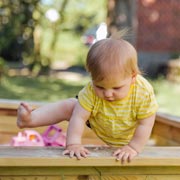 uncoordinated and will struggle with a variety of physical tasks.
uncoordinated and will struggle with a variety of physical tasks.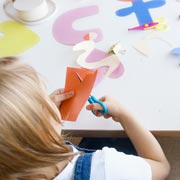 Reciprocal bilateral coordination: this is where both sides of the body form a rhythmic motion but the movements on each side alternate. Examples include walking, swimming and cycling.
Reciprocal bilateral coordination: this is where both sides of the body form a rhythmic motion but the movements on each side alternate. Examples include walking, swimming and cycling.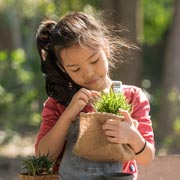 Mastery of bilateral coordination requires children to develop and fine-tune three types of motor skill:
Mastery of bilateral coordination requires children to develop and fine-tune three types of motor skill: Threading beads on a string, or string through holes punched though paper or card;
Threading beads on a string, or string through holes punched though paper or card;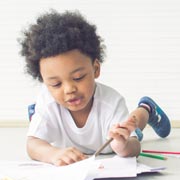 Play-doh — squeezing and rolling it, including use of tools to shape it;
Play-doh — squeezing and rolling it, including use of tools to shape it; These are just a few examples. Any age-appropriate game or activity is likely to help improve bilateral coordination so long as it requires precise, measured movements and coordination of both sides of the body. It’s a case of the child practising over time, often through play, until a particular physical outcome has been mastered. Progress is particularly easy to see in babies and infants as they gradually become more physically able, dextrous, strong and coordinated.
These are just a few examples. Any age-appropriate game or activity is likely to help improve bilateral coordination so long as it requires precise, measured movements and coordination of both sides of the body. It’s a case of the child practising over time, often through play, until a particular physical outcome has been mastered. Progress is particularly easy to see in babies and infants as they gradually become more physically able, dextrous, strong and coordinated.